Posted by on
09/09/2025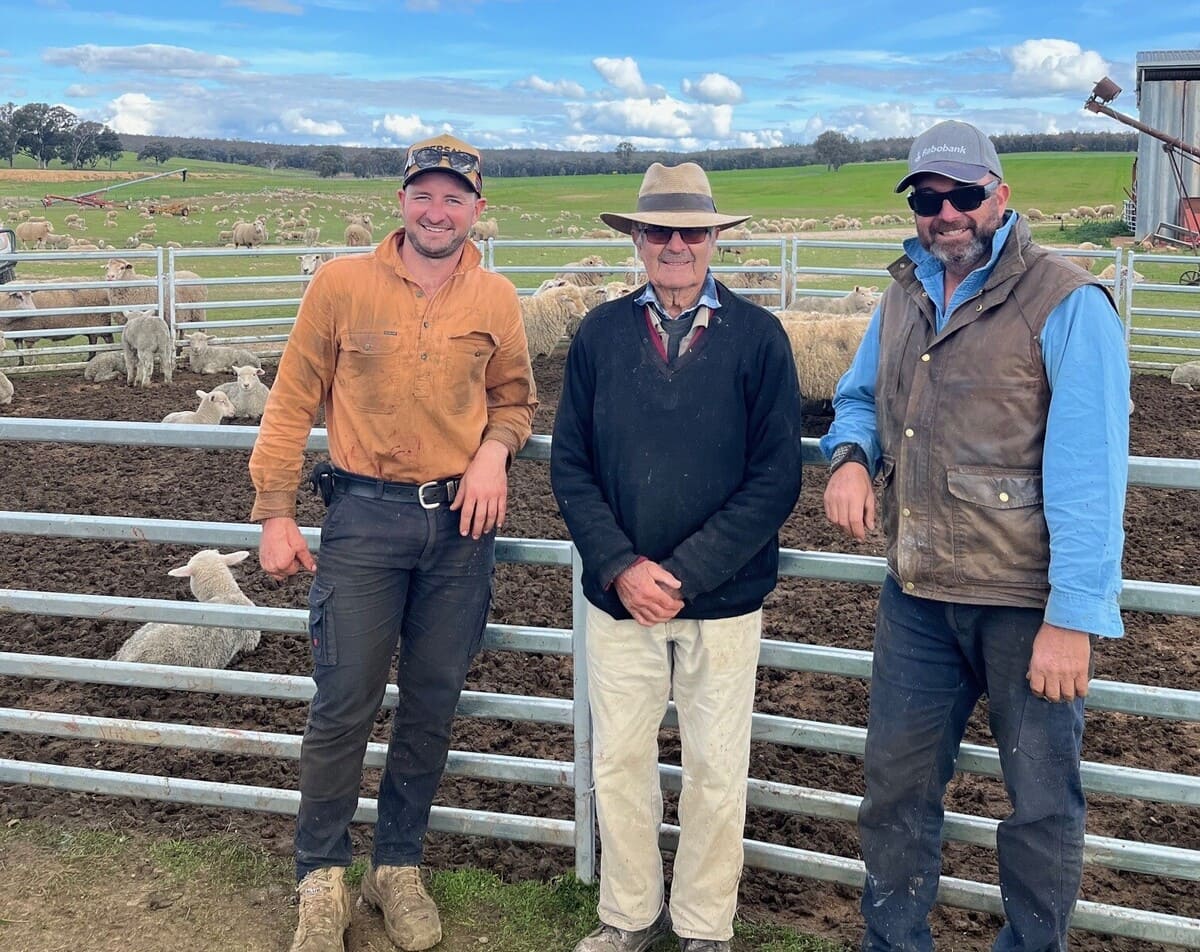
Tom, Murray and Garry Anderson, three generations working together.
It’s a rare gift to have three generations working side-by-side, and collectively Murray, Garry and Tom Anderson personify the evolution of Australian farming.
Garry and wife Belinda, alongside Garry’s parents Murray and Ruth, have progressed and expanded the family’s Mangoplah farming operation, diversifying the traditional wool operation into cropping and irrigation – and adding scale that affords all three generations a place in the business.
“It’s very special to have the three generations all here working together, and at 84 Murray has lived agriculture’s huge progression – he has many stories about how many gates he had to open on the road to Wagga, or riding his horse to school,” Belinda smiles.
And despite the enormous technological gains that underpin the Andersons' modern operation, there’s still plenty on farm to keep him busy.
“Murray is a sheep man through and through, so whether it’s checking ewes when they’re lambing, or monitoring feed and water, he really loves remaining part of the day-to-day operation, as do we.”
Building a strong intergenerational business
Having returned home to the family property in the late 80s, Garry and Belinda transitioned into cropping, a growing enterprise in the region and one that would complement their existing livestock operation.
For the past thirty years they’ve remained on the forefront of cropping progression, benefitting from valuable industry innovation such as no-till farming, variable rate technology, and soil sampling.
“The efficiency gains we’ve made have been incredible, and the use of data and technology has strengthened our business greatly, without being a huge cost burden.”
Sheep remain an important part of the business, and over the decades the family has experimented with different breeds and programs, today focussing on lamb and wool production.
A ram breeding enterprise also affords the Andersons an opportunity to develop an operation fit for purpose.
“When we looked at our figures, we were spending $30,000 a year on rams, and they were still not quite hitting the mark,” Belinda explains.
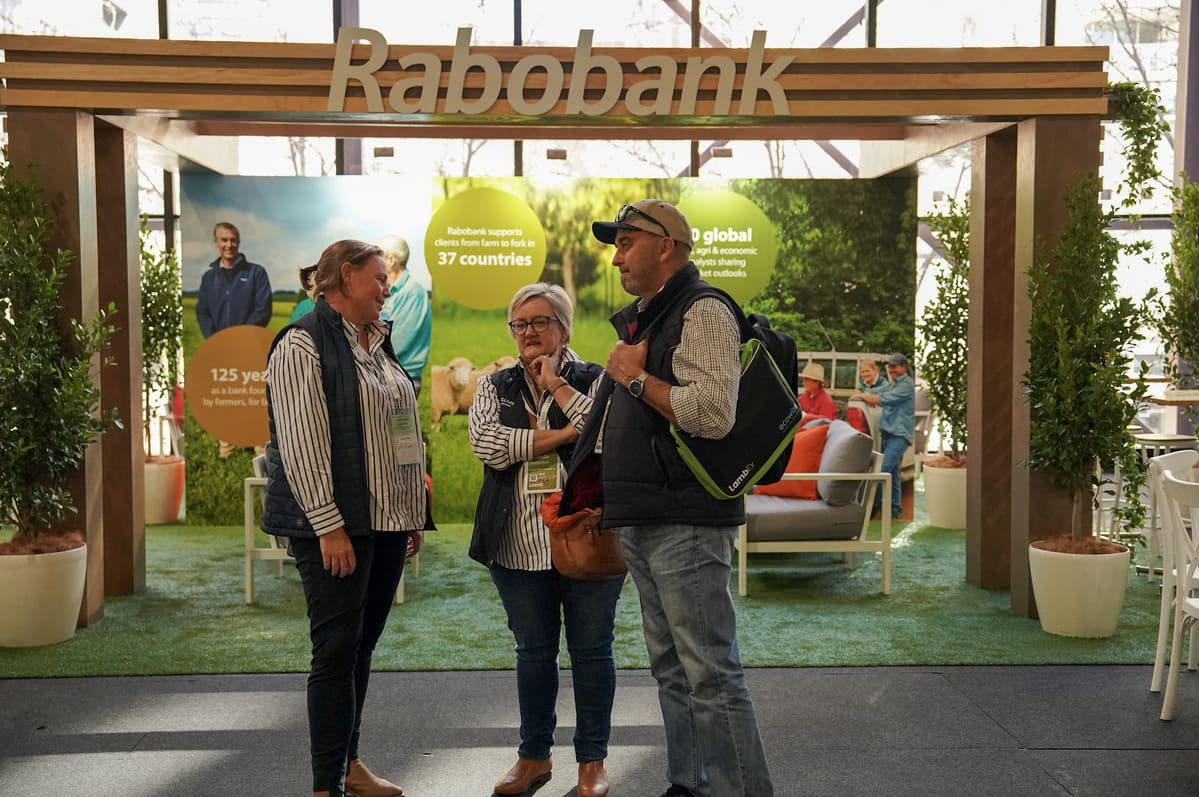
Belinda and Garry with Rabobank’s Georgia Twomey at Lambex 2024
“We were after a really meaty Merino, full bodied but with finer wool for dual purpose, and so we decided to breed exactly what we needed ourselves.”
Now into a third generation of custom-bred rams, the Andersons are beginning to produce rams with wool as low as 18 microns whilst retaining a solid, full-bodied sheep and breeding a “future-fit wool and sheepmeat article”.
Thinking outside the expansion box
Looking to grow their business, in recent years the family has expanded its operation, purchasing an irrigation property in the Coleambally region.
“We’d been looking for a block for a while, something with a longer season than our home block – yet with these sort of properties selling for over $10,000 an acre we decided to take a different approach.”
“We decided to invest in a property that created the longer season by the inclusion of water, and by extending our search out to Coleambally we were able to buy three times the land for the same money, which included a water allocation.”
With no experience in irrigation, Belinda admits it’s been a huge learning curve – eased thanks to the generous support and knowledge-sharing from the Coleambally Irrigation System, and great neighbours.
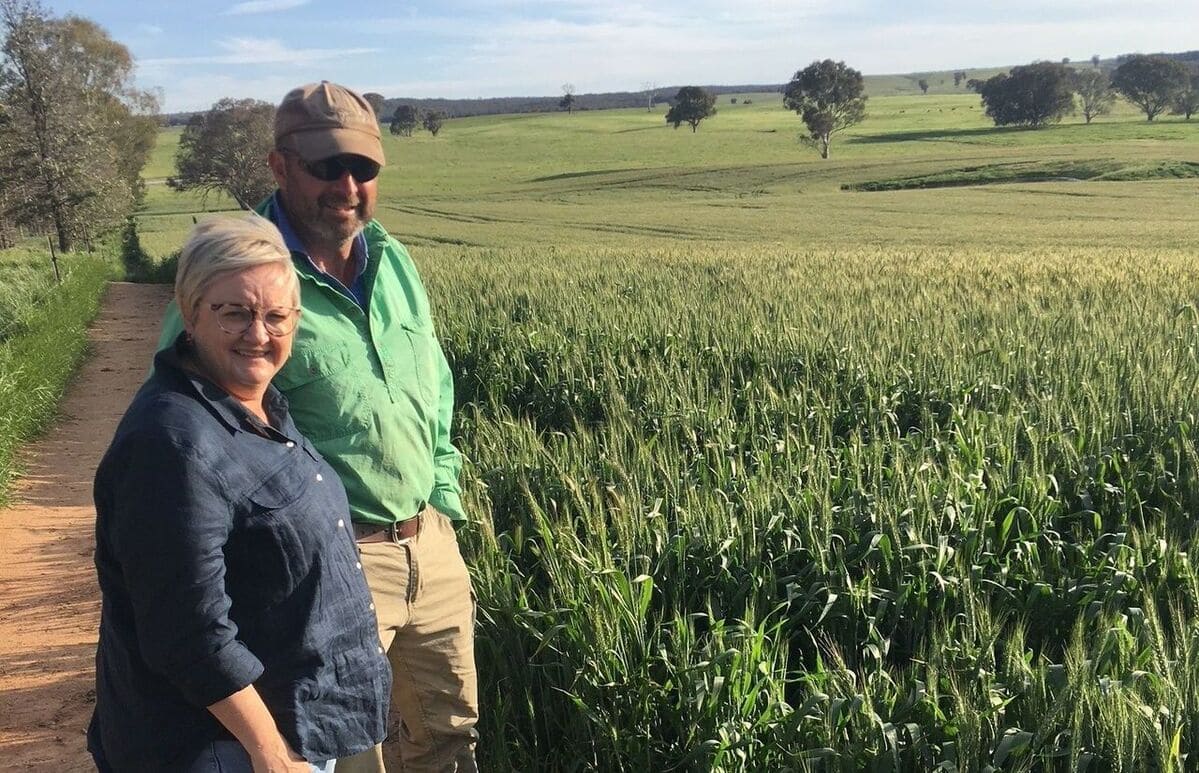
Belinda and Garry are thinking outside the box to grow their business.
The venture has also injected an exciting new challenge into the operation.
“The boys are absolutely loving their new irrigation chapter, we often take a drive around the property and love the change in landscape and different farming system, it’s been a really welcome change.”
The Andersons have been able to expand their winter cereal program thanks to their irrigation capacity, and are diversifying into seed crops such as sorghum, canola, and niche seed crops such as lucerne and Phalaris.
Rabobank by their side
Supporting them on their business growth journey is the family’s long-term Rabobank rural manager, Brian Mitchell.
It’s a business relationship that Belinda explains has transitioned into friendship.
“We have an extremely easy working relationship with Brian, his is almost a specialist role - he knows the right questions to ask when it’s time for us to make a decision, and he’s been invaluable in supporting our expansion into the Coleambally property.”
“Our relationship with Brian is very important to the success of our business, we need someone who is all over our financials and the complexities of agriculture to understand where we’re going, and knowing that Brian’s, and Rabobank’s, prime focus is agriculture is important.”
Leading industry progression through Henty Machinery Field Days
The Andersons focus on business growth and efficiency is reflected on farm, and off, with Belinda the tireless CEO of the Henty Machinery Field Days – one of Australia’s largest agricultural showcases.
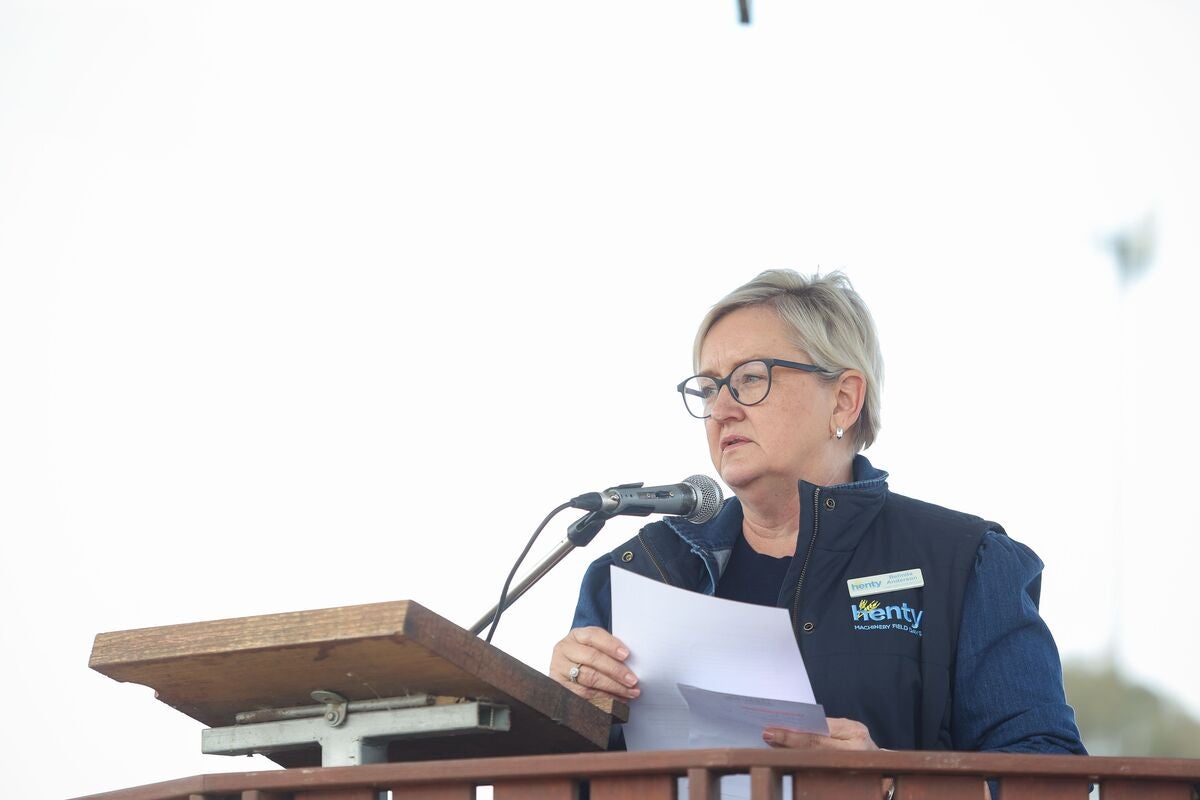
Belinda taking a lead at the Henty Machinery Field Days
Having spent the past 12 years as CEO, Belinda enjoys a fascinating first-hand insight into the trends, technology and innovation driving the ag industry, and how this is reflected on the ground.
“Previously we had strong demand for really large sites, with frontages of 50 metres or more, and while that demand is still strong, we’re getting a lot more exhibitors requesting small three by three spaces, such is the shift towards smaller ag tech innovation.”
Since Covid, this year marks the third year the event has sold out of exhibitor spaces – which was unheard of previously, and Belinda believes it’s a testament to the event and the broad, competitive offering it provides the customer base.
“There’s a huge appetite for modern agriculture – for evolving technology and machinery efficiency, and we’re proud to be able to present that all on the one purpose-built site.”
The role of women in agriculture has also created opportunity, Belinda believes.
“I’ve really noticed that women have become far more active at Henty, they’re talking to salespeople and they’re involved in purchase decisions – their role has dramatically changed over the past decade, which is great to see.”
The event, to be held from September 23 to 25, attracts over 55,000 people over three days, including 857 exhibitors and transcends well beyond kicking tyres.
With a food area that demonstrates the region’s farm to fork offering, the Natural Fibre Fashion Awards, dog trials and the prestigious Machine of the Year Award, Henty Machinery Field Days represents a genuine agricultural and rural lifestyle showcase.
“We have a lot of educational institutions exhibiting, both secondary and tertiary, and there are so many opportunities at Henty for people to learn and find their pathway into the industry.”
Cooperative values align
With the event organised by the Henty Machinery Field Day Cooperative Ltd, Belinda said the cooperative model includes members aged from 14 to 84, and that the event’s values align closely with Rabobank – which also operates under a cooperative model.
“Cooperative values are so vital to regional and rural Australia, and I see many shared values between Henty and Rabobank,” Belinda explains.
“Rabobank has such a strong focus on giving back to the community – whether it’s through sponsorship, or the Rabo Client Council – the opportunity the bank provides the community, from Financial Skills Workshops to RaboTruck networking events, are admirable.”
Henty Machinery Field Days is equally invested in supporting the local community, and engages with 27 community groups, providing a myriad of opportunities for local organisations to leverage the event and raise money.
“From parking cars, to running the bar or the food shed, if there’s a role that needs filling, we’ll make sure it goes to a local community group.”
Overall, the event is estimated to return $72 million back into the local economy, with $400,000 of that going directly back into local community groups.
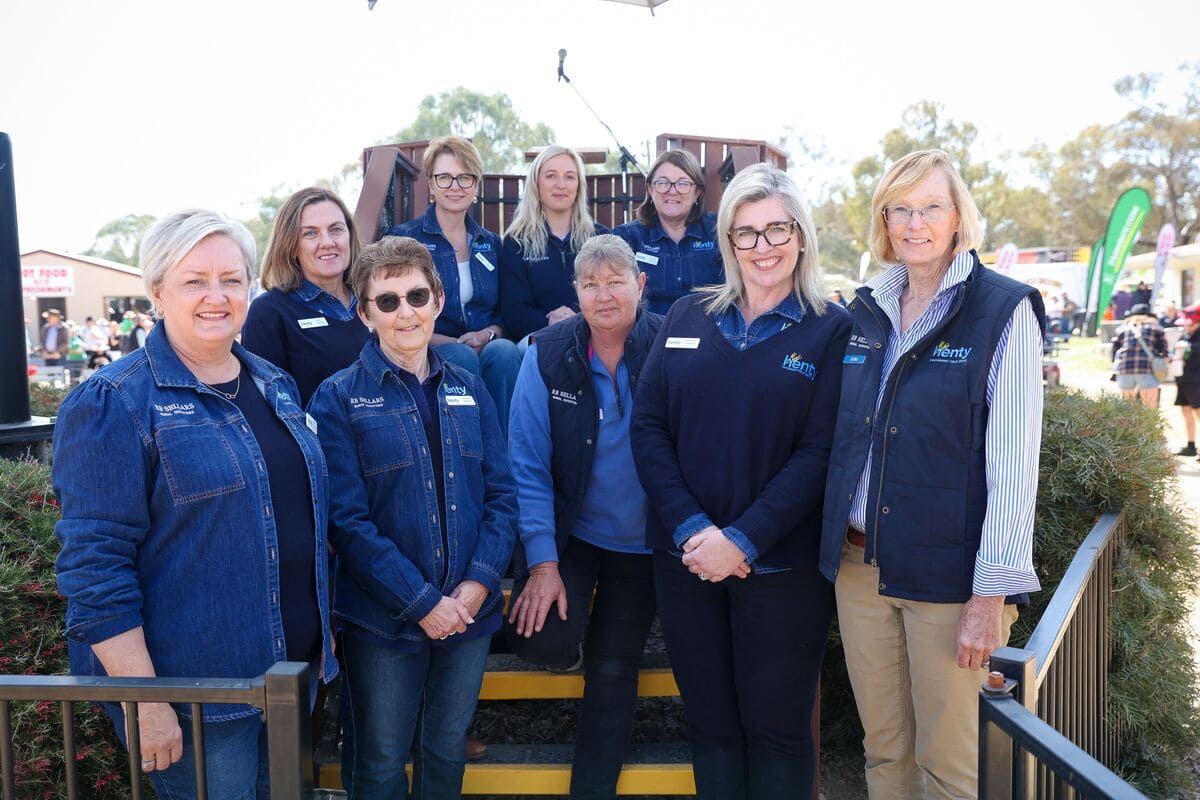
Organising a field day as significant as Henty is a full team effort.
And there have been challenges, such as two years off during Covid, and a wet year in 2022 reducing car parking capacity significantly, to the point where the gates were closed and around 2,000 cars had to be turned away.
“Every year we learn something new, and while we do seem to have the formula correct for a great event, we’re in a constant state of review – we’re always conscious of how we can improve, and some years, like 2022, you just have to play the cards you’re dealt.”
And while her position affords her a firsthand glimpse of some of the industry’s latest innovation, she laughs that she’s usually too busy to take a good look around at the sites.
“Luckily Garry always goes to Henty with a wish list, he has one day purely for socialising and then another day where he and Thomas mean business.”
A business, and a community, to be proud of
With son Tom, his wife Mikaela and their three young daughters Daisy, Ava and Camilla, also home on the farm, and Belinda and Garry’s three adult daughters Sophie, Sarah and Hannah also pursuing careers in the Wagga region, Belinda is grateful to have family so close at hand.
She also proudly reflects on the business the family has built, and the long-term vision she and Garry share, now realised.
“It’s quite surreal when I think about the 20-year-old newly married girl I was when I first moved here, and the gentle evolvement of our business into today what is quite a large enterprise.”
“I love standing on my favourite hill and looking out at our crops and our livestock, and while there’s definitely been tough times when we’ve questioned why we do it, to be in this position now with four generations all living on-farm, and our daughters close by, it certainly makes it all worthwhile.”
